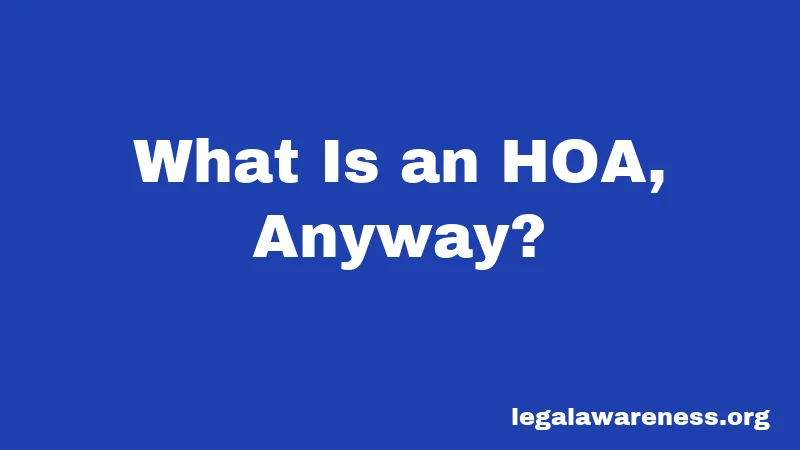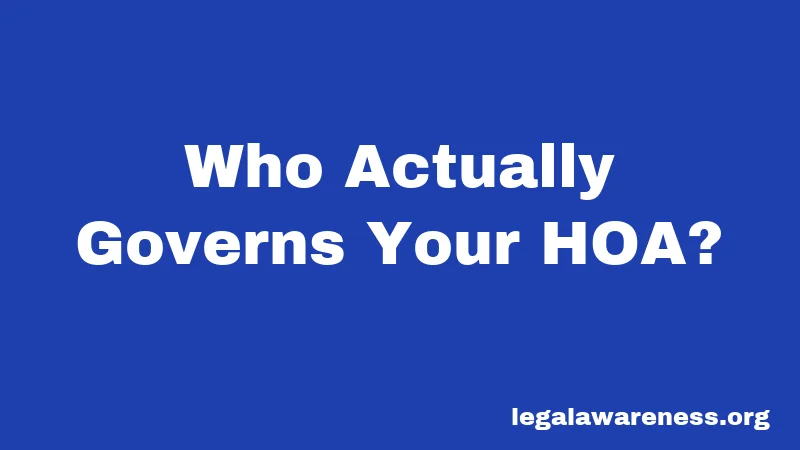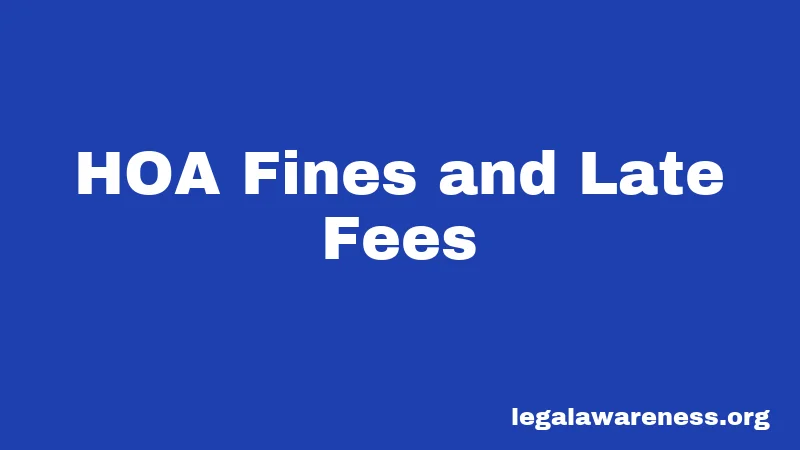HOA Laws in Pennsylvania (2026): Your Complete Homeowner’s Guide
Most people who move into a Pennsylvania HOA community have absolutely no idea what they’re signing up for. Seriously. You get swept up in the excitement of finding a home, sign some papers, and suddenly you’re bound by community rules you might not fully understand. But here’s the thing: Pennsylvania’s HOA laws are pretty strict, and knowing them actually matters.
Whether you’re a new homeowner in a planned community or thinking about moving to one, understanding these rules protects both your rights and your wallet. Let’s break down what you need to know about Pennsylvania HOAs—no lawyer jargon required.
What Is an HOA, Anyway?

Okay, pause. Let me explain what we’re actually talking about here.
An HOA (homeowners association) is basically a group of property owners who band together to manage their community. Think of it like a mini-government for your neighborhood. The HOA maintains common areas like pools, roads, and landscaping. They enforce community rules. They collect money from homeowners to pay for all of this.
When you buy a home in a Pennsylvania HOA community, you automatically become a member. You don’t get to opt out. You’re in. And yes, you have to pay dues—that’s called an assessment.
The key thing that makes Pennsylvania HOAs work is something called a “declaration.” This is a legal document recorded in the county where your property sits. It lays out all the rules, restrictions, and what the HOA can and cannot do. It’s like the constitution of your neighborhood.
Pennsylvania’s Main HOA Laws
Here’s where it gets important. Pennsylvania doesn’t regulate HOAs through a single agency. Instead, the state uses two main laws: the Uniform Planned Community Act (UPCA) and the Uniform Condominium Act (UCA).
The Uniform Planned Community Act applies to planned communities with more than 12 units that were created after February 3, 1997. If your community is larger and newer, this law probably governs it.
The Uniform Condominium Act applies to condominiums. The main difference? In a condo, the association owns common areas. In a planned community under the UPCA, each homeowner owns their unit, but the HOA manages the common property like roads and shared landscaping.
You’ll find these laws in Title 68 of the Pennsylvania Consolidated Statutes. Chapters 51 through 54 cover the UPCA. But don’t worry—you don’t need to read legal code to understand the basics.
Who Actually Governs Your HOA?

The HOA board runs everything. These are volunteer homeowners (hopefully) who make decisions about community rules, budgets, and finances.
The board must follow the association’s bylaws. These bylaws set up how meetings happen, how elections work, and how the association operates day-to-day. They also define what the board can and cannot do.
Here’s something important: board members have what’s called a “fiduciary duty.” That’s a fancy way of saying they have to act in the best interests of the community, not themselves. They need to maintain good records, follow the law, and manage money responsibly.
In reality? Some boards do this well. Some don’t. That’s why homeowners need to stay informed.
What HOAs Can Do (And What They Can’t)
This is where things get interesting. Pennsylvania law actually gives HOAs a lot of power.
HOAs can collect mandatory assessments from every homeowner. These are dues you have to pay. The board decides the amount, and if you don’t pay, there are serious consequences (more on that later).
HOAs can also issue fines if you violate community rules. But here’s the catch—they have to give you notice and a chance to respond before they can fine you. They can’t just surprise you with a penalty.
Now, what can’t they do? This is critical.
HOAs cannot restrict you from displaying the American flag, the Pennsylvania flag, or a military flag. Federal law protects this. They can ask that you display it respectfully, but they can’t ban it.
HOAs also cannot ban satellite dishes or certain antennas. The Federal Communications Commission (FCC) has rules protecting these, and the HOA’s rules can’t override federal law.
And this one’s big: HOAs cannot discriminate against protected classes. No rules that treat people differently based on race, color, religion, national origin, gender, age, disability, or family status. The Pennsylvania Human Relations Act and the federal Fair Housing Act both protect homeowners here.
Wondering if this applies to you? If the HOA’s rule treats someone differently because of who they are, it’s probably unenforceable.
HOA Fines and Late Fees

Let’s talk money, because this is where HOA disputes usually start.
If you break a community rule, the HOA can fine you. The amount depends on what the bylaws say. Before they fine you, they must give you written notice and a chance to be heard. You get to explain your side.
What counts as a rule violation? It could be exterior paint color. Parking violations. Landscaping that doesn’t match community standards. The governing documents spell this out.
But here’s where homeowners sometimes get blindsided: if you don’t pay your HOA assessment on time, the HOA can charge you late fees. These can add up fast. The association can also file a lien against your property. This means they have a legal claim on your home.
This part gets really serious: if your assessment stays unpaid, the HOA can actually foreclose on your home. Yes, that’s a thing in Pennsylvania. The statute of limitations for the HOA to take legal action (like foreclosure) is four years from when the assessment became due. After that, they generally lose the ability to collect through the courts.
That’s why it’s critical to pay assessments on time, even if you disagree with how the HOA is spending money.
Your Rights as a Homeowner
Okay, here’s the good news. Pennsylvania law actually gives homeowners some solid protections.
You have the right to attend board meetings. You can participate in discussions, except during executive sessions (closed meetings). These sessions happen when boards talk about personnel issues or legal matters.
You also have the right to review financial documents. The HOA must give you copies of financial statements, budgets, and meeting minutes when you ask. If they don’t provide these within 30 days, you can file a complaint with the Pennsylvania Attorney General’s Office.
You can vote in board elections and on major decisions like amendments to governing documents. Each homeowner generally gets one vote per property.
You can challenge fines or alleged rule violations. The HOA can’t just punish you without giving you a chance to respond. This is called due process.
You also have a right to enjoy your property within reasonable community standards. The HOA can’t enforce rules in a way that’s arbitrary or unfairly discriminatory.
Here’s something homeowners often miss: you have the right to see the association’s declaration. This is a public record. You can get a copy from the county Recorder of Deeds office. This document spells out what the HOA can and can’t do, what restrictions apply to your property, and what you’re legally bound to follow.
Buying a Home in an HOA Community
If you’re thinking about buying a home in a Pennsylvania HOA community, there’s something you need to know.
Before you close on the house, the seller must give you a public offering statement. This is a document that describes the community, the HOA’s rules, fees, and other important details. You get seven days to review it. You have the right to cancel the deal if you want to.
Honestly, this is the part most people miss. Don’t skip reading that statement. It tells you what you’re agreeing to.
Once you close and you own the property, you’re automatically part of the HOA. You can’t opt out. You have to follow the rules and pay assessments for as long as you own the home.
HOA Assessments and Budgets
The HOA creates a budget every year. That budget covers maintaining common areas, paying for insurance, managing the office, and whatever else the community needs.
To pay for all this, the HOA collects assessments from every homeowner. These are mandatory fees. The amount varies wildly depending on your community. Some HOAs charge $200 a month. Others charge $500. Some charge more.
Pennsylvania law doesn’t set a minimum or maximum. That’s up to the HOA. But the board has to be reasonable and transparent about how they decide the amount.
Pennsylvania doesn’t require HOAs to maintain minimum reserve funds for future repairs. But that doesn’t mean reserves are optional. Your board has a fiduciary duty to plan ahead for big expenses like roof replacements or road repairs. Many boards commission reserve studies to figure out how much money they should save.
If the HOA’s reserves aren’t enough to cover major repairs, the board can issue a special assessment. This is an extra bill sent to homeowners. It’s not fun, but it happens.
When Homeowners and HOAs Disagree
Sometimes homeowners and HOAs don’t see eye to eye. Maybe you think the HOA’s fine is unfair. Maybe you believe a rule is too strict or discriminatory.
If this happens to you, here’s what you can do:
First, bring your concern to the board in writing. Be specific. Reference the exact rule or decision you’re challenging. Provide documentation that backs up your position.
If the board won’t listen, you can attend a board meeting and speak during open comment. Many boards reconsider things when homeowners ask questions.
If you believe the HOA is breaking Pennsylvania law, you can file a complaint. Where you file depends on what the problem is. For financial issues, contact the Pennsylvania Attorney General’s Office or the Bureau of Consumer Protection. For housing discrimination, file with the Pennsylvania Human Relations Commission or the U.S. Department of Housing and Urban Development.
You also have the right to sue in state court if the HOA violates your rights.
Sometimes homeowners don’t realize how much authority they actually have. If enough of you care about an issue, you can change things. HOAs answer to their members.
Rules That Don’t Hold Up in Court
Not every rule an HOA creates is actually legal. Pennsylvania courts have struck down plenty of HOA rules over the years.
Rules that are vague or unclear probably aren’t enforceable. For example, an HOA can’t fine you for having a “messy” yard without defining what that means. But they can fine you for not mowing grass over a certain height—that’s specific.
Rules that contradict federal or state law are unenforceable. This includes anything that breaks fair housing laws or violates free speech rights.
Rules that weren’t properly adopted through the HOA’s bylaws might not hold up either. The board has to follow proper procedures.
And rules that are enforced inconsistently are a problem. If the HOA fines one homeowner for a violation but ignores the same violation from another homeowner, that’s not fair or legal.
Sound complicated? It’s actually one place where consulting an attorney makes sense. If you think a rule is unfair or unenforceable, a lawyer familiar with Pennsylvania HOA law can review your situation.
Special Rules You Should Know
Here are a few things that come up a lot in Pennsylvania HOAs:
Satellite Dishes and Antennas: Even if your governing documents say no, federal law protects your right to install certain satellite dishes and antennas. The HOA can require reasonable placement rules, but they can’t ban them entirely.
Solar Panels: Solar panels get special protection in Pennsylvania. HOAs can have reasonable rules about placement and appearance, but they can’t prohibit them outright.
American Flags: As mentioned, you can display the flag. Your HOA can require it to be displayed respectfully according to federal flag code, but they can’t ban it.
Short-Term Rentals: Some HOAs restrict or ban short-term rentals (like Airbnb). Whether they can legally do this depends on the declaration and state law. If you want to rent out your home short-term, check your governing documents first.
Architectural Review: Most HOAs require approval before you paint the exterior, add a deck, or make other changes. This is usually legal, but the process has to be fair and the standards have to be clear.
How to File a Complaint Against Your HOA
If you believe the HOA is violating Pennsylvania law, you have options:
For housing discrimination complaints, contact the Pennsylvania Human Relations Commission or file a federal complaint with the U.S. Department of Housing and Urban Development (HUD).
For financial violations, contact the Pennsylvania Attorney General’s Office, the Bureau of Consumer Protection, or the Federal Trade Commission (FTC).
Under the Fair Debt Collection Practices Act, you can also file in state or federal court within one year if you believe the HOA violated debt collection rules.
For other legal disputes, you can file a claim in state court in the appropriate county.
Keep documentation of everything. Write down dates, names of people you talked to, and what happened. Save emails and letters. This gives you evidence if you need to file a complaint or go to court.
When Can an HOA Be Dissolved?
Can you get rid of your HOA? Technically, yes. But it’s really, really hard.
To dissolve an HOA in Pennsylvania, you need approval from at least 80% of unit owners. That’s a huge majority. And everyone who agrees has to sign a termination agreement. Then that agreement has to be recorded in every county where the HOA has property.
If you’re thinking about this, talk to an attorney. It’s complicated and rarely happens in practice.
Frequently Asked Questions
Can an HOA force me to sell my home? No. But they can foreclose on your property if you don’t pay assessments. That’s different—it’s about debt, not forcing you out. Keep your assessments current and this won’t happen.
What happens if I disagree with my HOA’s budget? You can attend board meetings and voice your opinion. You can vote against budget amendments if they come to a vote. But individual homeowners generally can’t override board decisions about the overall budget. Your real power is voting in board elections and electing people who share your values.
Does the HOA have to use my assessment money for what I want? No. The board decides how money gets spent, as long as it’s for legitimate community purposes. You don’t get to pick and choose. It’s a collective decision.
Can the HOA change the rules without asking homeowners? This depends on the governing documents. Some rules can be changed by the board. Major changes—like amendments to the declaration—usually need homeowner approval. Check your bylaws.
What if the HOA is not paying for maintenance and things are falling apart? Document everything. Take photos. Write to the board formally asking them to address the issues. If they ignore serious maintenance problems, you might have a claim against them for failing their fiduciary duties. An attorney can help here.
Is there a limit to how much the HOA can charge in assessments? Pennsylvania law doesn’t set a maximum. But the board has to be reasonable and follow the procedures in your governing documents. If assessment increases are wildly out of line, you might challenge them, but you’d need legal help.
Final Thoughts
Here’s the bottom line: Pennsylvania HOA laws exist to protect both the association and individual homeowners. They give HOAs the power they need to manage communities effectively. But they also give homeowners rights and protections.
The key is staying informed. Read your governing documents. Attend board meetings. Ask questions. Keep up with assessments. Understand that you have rights, but the HOA has rights too.
If something feels off—whether it’s an unfair fine, financial mismanagement, or rules that seem discriminatory—don’t just accept it. Do your research. Talk to neighbors. If necessary, consult an attorney. Pennsylvania’s courts and agencies exist to help when HOA disputes can’t be resolved at the community level.
Your home is probably your biggest investment. It makes sense to understand the rules and protections that come with it. Now you do. Stay informed, stay proactive, and when in doubt, ask a lawyer.
References
- Pennsylvania Uniform Planned Community Act (Title 68, Chapters 51-54)
- Pennsylvania Uniform Condominium Act (Title 68, Chapters 3101-3330)
- Pennsylvania Human Relations Commission – Housing Discrimination
- Pennsylvania Attorney General – Bureau of Consumer Protection
- U.S. Department of Housing and Urban Development (HUD)
- Federal Communications Commission – Antenna and Satellite Dish Rules
- Pennsylvania Department of State – HOA Directory and Corporate Records
- Homeowners Protection Bureau – Pennsylvania HOA Resources

Very enlightening! I’m a Board Chairman in a still developing condo/community and you have given (in my opinion) an excellent overview of the responsibilities of the board and the protections for the board, and the condo, duplex and single family homeowners.
Thank you for the kind words. I’m glad the article was useful, especially given your role as Board Chairman.